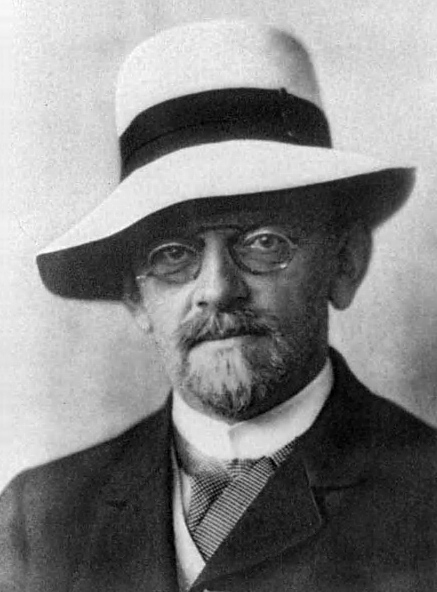Frases célebres de David Hilbert
Fuente: The universal book of mathematics: from Abracadabra to Zeno's paradoxes http://books.google.es/books?id=0YiXM-x--4wC&pg=PA273. David J. Darling. John Wiley and Sons, 2004. ISBN 471270474, pág. 273
Mathematical Circles Revisited (1971) by Howard Whitley Eves
David Hilbert: Frases en inglés
“Good, he did not have enough imagination to become a mathematician.”
Upon hearing that one of his students had dropped out to study poetry, as quoted in [http://books.google.com/?id=nnpChqstvg0C&pg=PA151 The Universal Book of Mathematics (2004) by David J. Darling, p. 151
Hilbert-Courant (1984) by Constance Reid, p. 143
Mathematical Problems (1900)
Contexto: History teaches the continuity of the development of science. We know that every age has its own problems, which the following age either solves or casts aside as profitless and replaces by new ones. If we would obtain an idea of the probable development of mathematical knowledge in the immediate future, we must let the unsettled questions pass before our minds and look over the problems which the science of today sets and whose solution we expect from the future. To such a review of problems the present day, lying at the meeting of the centuries, seems to me well adapted. For the close of a great epoch not only invites us to look back into the past but also directs our thoughts to the unknown future.
Mathematical Problems (1900)
Contexto: Mathematical science is in my opinion an indivisible whole, an organism whose vitality is conditioned upon the connection of its parts. For with all the variety of mathematical knowledge, we are still clearly conscious of the similarity of the logical devices, the relationship of the ideas in mathematics as a whole and the numerous analogies in its different departments. We also notice that, the farther a mathematical theory is developed, the more harmoniously and uniformly does its construction proceed, and unsuspected relations are disclosed between hitherto separate branches of the science. So it happens that, with the extension of mathematics, its organic character is not lost but only manifests itself the more clearly.
Mathematical Problems (1900)
Contexto: A mathematical problem should be difficult in order to entice us, yet not completely inaccessible, lest it mock at our efforts. It should be to us a guide post on the mazy paths to hidden truths, and ultimately a reminder of our pleasure in the successful solution.
“To new concepts correspond, necessarily, new signs.”
Mathematical Problems (1900)
Contexto: To new concepts correspond, necessarily, new signs. These we choose in such a way that they remind us of the phenomena which were the occasion for the formation of the new concepts.
Eine mathematische Theorie ist nicht eher als vollkommen anzusehen, als bis du sie so klar gemacht hast, daß du sie dem ersten Manne erklären könntest, den du auf der Straße triffst.
Mathematical Problems (1900)
Contexto: An old French mathematician said: A mathematical theory is not to be considered complete until you have made it so clear that you can explain it to the first man whom you meet on the street. This clearness and ease of comprehension, here insisted on for a mathematical theory, I should still more demand for a mathematical problem if it is to be perfect; for what is clear and easily comprehended attracts, the complicated repels us.
“Only an idiot could believe that scientific truth needs martyrdom”
Hilbert (2nd edition, 1996) by Constance Reid, p. 92
Contexto: But he (Galileo) was not an idiot,... Only an idiot could believe that scientific truth needs martyrdom — that may be necessary in religion, but scientific results prove themselves in time.
"Axiomatic Thought" (1918), printed in From Kant to Hilbert, Vol. 2 by William Bragg Ewald
Quoted in Mathematical Circles Revisited (1971) by Howard Whitley Eves
“Physics is too difficult for physicists!”
This quote has many variants. An early version attributed to the Göttingen School appears in a book review by Heinrich Wieleitner in Isis, Volume 7, No. 4, December 1925, p. 597: Ach, die Physik! Die ist ja für die Physiker viel zu schwer! (Oh, physics! That's just too difficult for the physicists!).
Disputed
Quoted in Mathematical Mysteries : The Beauty and Magic of Numbers (1999) by Calvin C. Clawson, p. 258
“No one shall expel us from the paradise that Cantor has created.”
Aus dem Paradies, das Cantor uns geschaffen, soll uns niemand vertreiben können.
"Über das Unendliche" [On the Infinite] in Mathematische Annalen 95, (1926)
“One of the supreme achievements of purely intellectual human activity.”
On the Cantor set, as quoted in A World Without Time : The Forgotten Legacy of Godel and Einstein (2005) by Palle Yourgrau, p. 44
Quoted in Constance Reid, "Hilbert" (1970)
“Keep computations to the lowest level of the multiplication table.”
Hilbert-Courant (1984) by Constance Reid, p. 104
“Begin with the simplest examples.”
Immer mit den einfachsten Beispielen anfangen.
Hilbert-Courant (1984) by Constance Reid, p. 104; German version quoted in Algebra by Michael Artin
Quoted in Mathematical Circles Revisited (1971) by Howard Whitley Eves
Quoted in Hilbert's Die Grundlagen der Mathematik (1927)
Wir müssen wissen — wir werden wissen!
Address to the Society of German Scientists and Physicians, in Königsberg (8 September 1930). The concluding statement was used as the epitaph on his tomb in Göttingen. Radio broadcast of the address http://math.sfsu.edu/smith/Documents/HilbertRadio/HilbertRadio.mp3, and transcription and English translation http://math.sfsu.edu/smith/Documents/HilbertRadio/HilbertRadio.pdf.
